Roberts A.D. The Cambridge History of Africa, Volume 7: from 1905 to 1940
Подождите немного. Документ загружается.

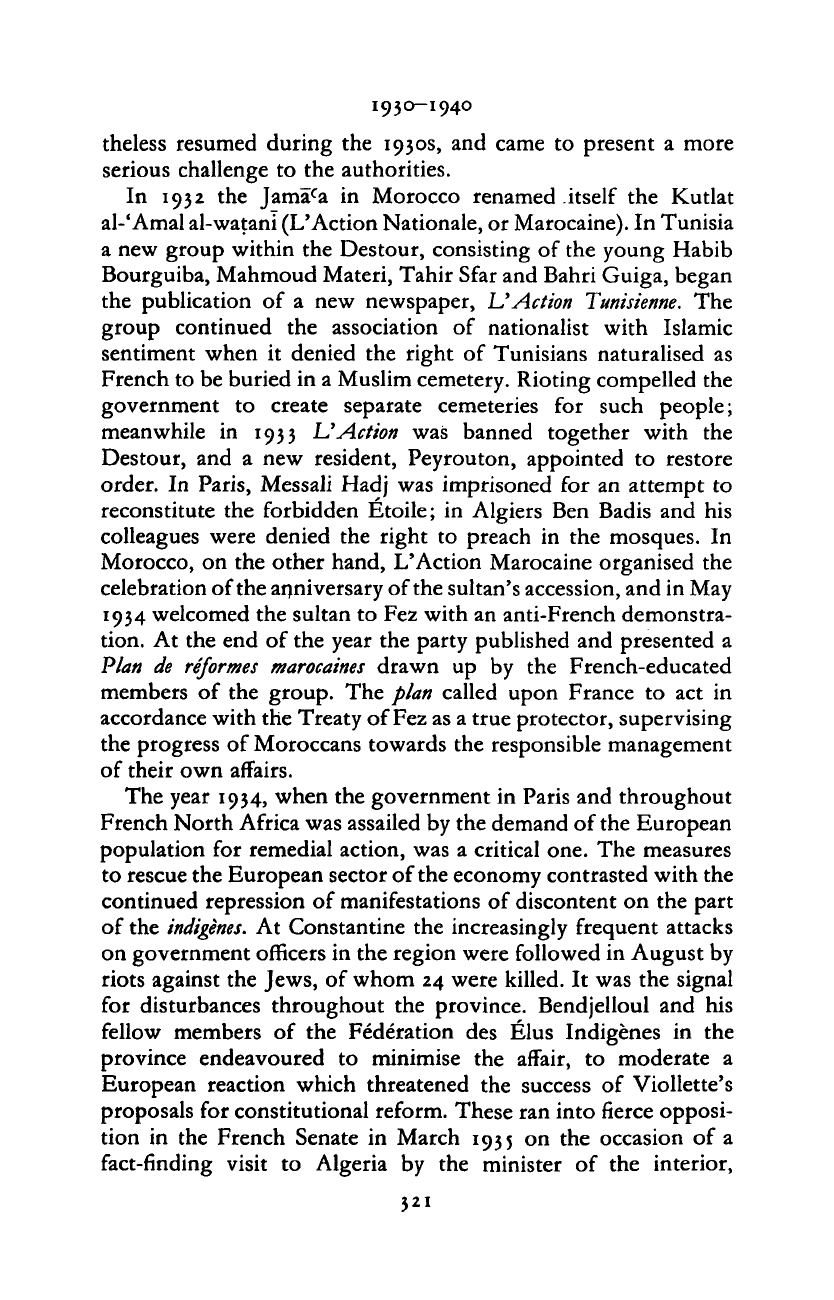
theless resumed during the 1930s, and came to present a more
serious challenge to the authorities.
In 1932 the Jama
f
a in Morocco renamed itself the Kutlat
al-'Amal al-watani (L'Action Nationale, or Marocaine). In Tunisia
a new group within the Destour, consisting of the young Habib
Bourguiba, Mahmoud Materi, Tahir Sfar and Bahri Guiga, began
the publication of a new newspaper, L'Action
Tunisienne.
The
group continued the association of nationalist with Islamic
sentiment when it denied the right of Tunisians naturalised as
French to be buried in a Muslim cemetery. Rioting compelled the
government to create separate cemeteries for such people;
meanwhile in 1933 U Action was banned together with the
Destour, and a new resident, Peyrouton, appointed to restore
order. In Paris, Messali Hadj was imprisoned for an attempt to
reconstitute the forbidden Etoile; in Algiers Ben Badis and his
colleagues were denied the right to preach in the mosques. In
Morocco, on the other hand, L'Action Marocaine organised the
celebration of the anniversary of the sultan's accession, and in May
1934 welcomed the sultan to Fez with an anti-French demonstra-
tion. At the end of the year the party published and presented a
Plan de
reformes marocaines
drawn up by the French-educated
members of the group. The plan called upon France to act in
accordance with the Treaty of Fez as a true protector, supervising
the progress of Moroccans towards the responsible management
of their own affairs.
The year 1934, when the government in Paris and throughout
French North Africa was assailed by the demand of the European
population for remedial action, was a critical one. The measures
to rescue the European sector of the economy contrasted with the
continued repression of manifestations of discontent on the part
of the
indigenes.
At Constantine the increasingly frequent attacks
on government officers in the region were followed in August by
riots against the Jews, of whom 24 were killed. It was the signal
for disturbances throughout the province. Bendjelloul and his
fellow members of the Federation des Elus Indigenes in the
province endeavoured to minimise the affair, to moderate a
European reaction which threatened the success of Viollette's
proposals for constitutional reform. These ran into fierce opposi-
tion in the French Senate in March 1935 on the occasion of a
fact-finding visit to Algeria by the minister of the interior,
321
Cambridge Histories Online © Cambridge University Press, 2008
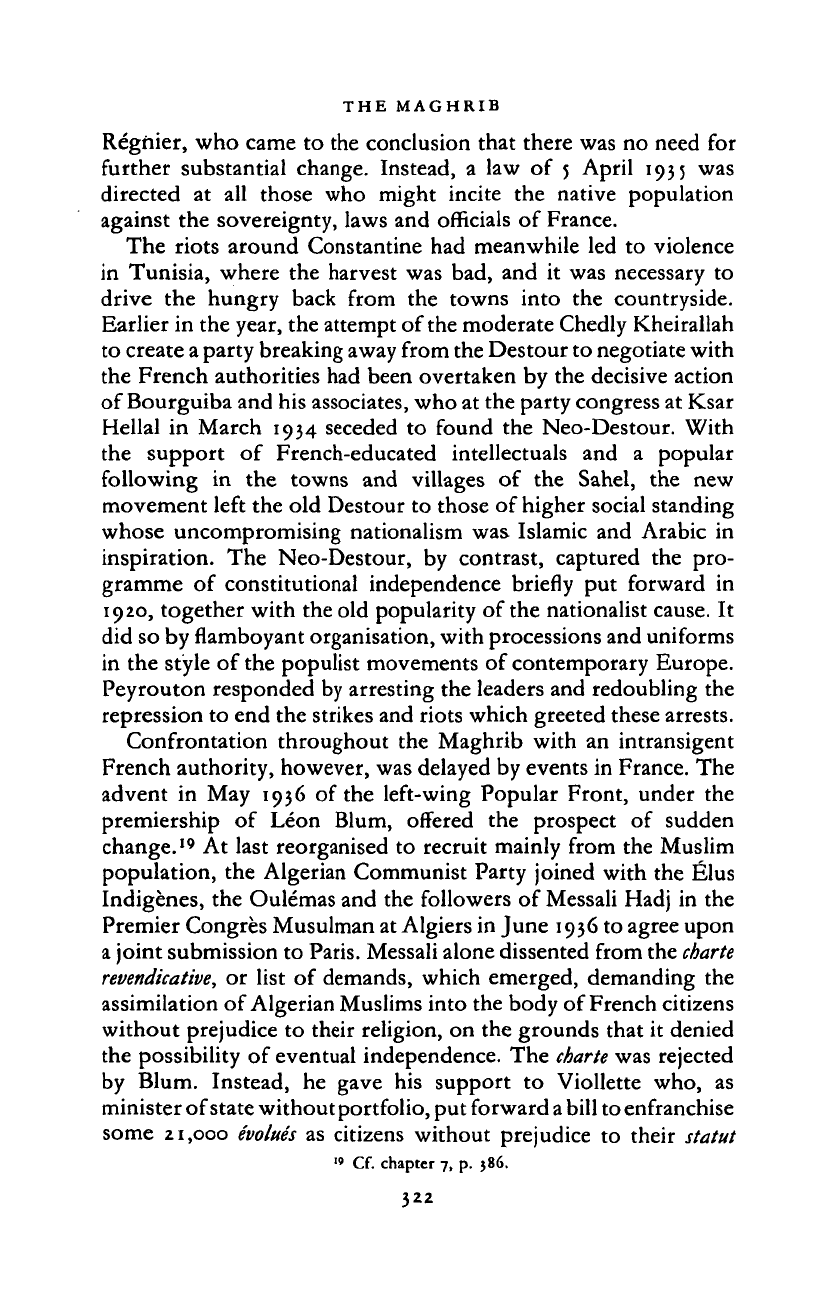
THE
MAGHRIB
Regnier, who came to the conclusion that there was no need for
further substantial change. Instead, a law of 5 April 1935 was
directed at all those who might incite the native population
against the sovereignty, laws and officials of France.
The riots around Constantine had meanwhile led to violence
in Tunisia, where the harvest was bad, and it was necessary to
drive the hungry back from the towns into the countryside.
Earlier in the year, the attempt of
the
moderate Chedly Kheirallah
to create
a
party breaking away from the Destour to negotiate with
the French authorities had been overtaken by the decisive action
of Bourguiba and his associates, who at the party congress at Ksar
Hellal in March 1934 seceded to found the Neo-Destour. With
the support of French-educated intellectuals and a popular
following in the towns and villages of the Sahel, the new
movement left the old Destour to those of higher social standing
whose uncompromising nationalism was Islamic and Arabic in
inspiration. The Neo-Destour, by contrast, captured the pro-
gramme of constitutional independence briefly put forward in
1920,
together with the old popularity of the nationalist cause. It
did so by flamboyant organisation, with processions and uniforms
in the style of the populist movements of contemporary Europe.
Peyrouton responded by arresting the leaders and redoubling the
repression to end the strikes and riots which greeted these arrests.
Confrontation throughout the Maghrib with an intransigent
French authority, however, was delayed by events in France. The
advent in May 1936 of the left-wing Popular Front, under the
premiership of Leon Blum, offered the prospect of sudden
change.
19
At last reorganised to recruit mainly from the Muslim
population, the Algerian Communist Party joined with the Elus
Indigenes, the Oulemas and the followers of Messali Hadj in the
Premier Congres Musulman at Algiers in June 1936 to agree upon
a joint submission to Paris. Messali alone dissented from the
charte
revendicative,
or list of demands, which emerged, demanding the
assimilation of Algerian Muslims into the body of French citizens
without prejudice to their religion, on the grounds that it denied
the possibility of eventual independence. The
charte
was rejected
by Blum. Instead, he gave his support to Viollette who, as
minister of state without portfolio, put forward
a bill to
enfranchise
some 21,000
evolues
as citizens without prejudice to their statut
">
Cf.
chapter
7, p. 386.
322
Cambridge Histories Online © Cambridge University Press, 2008
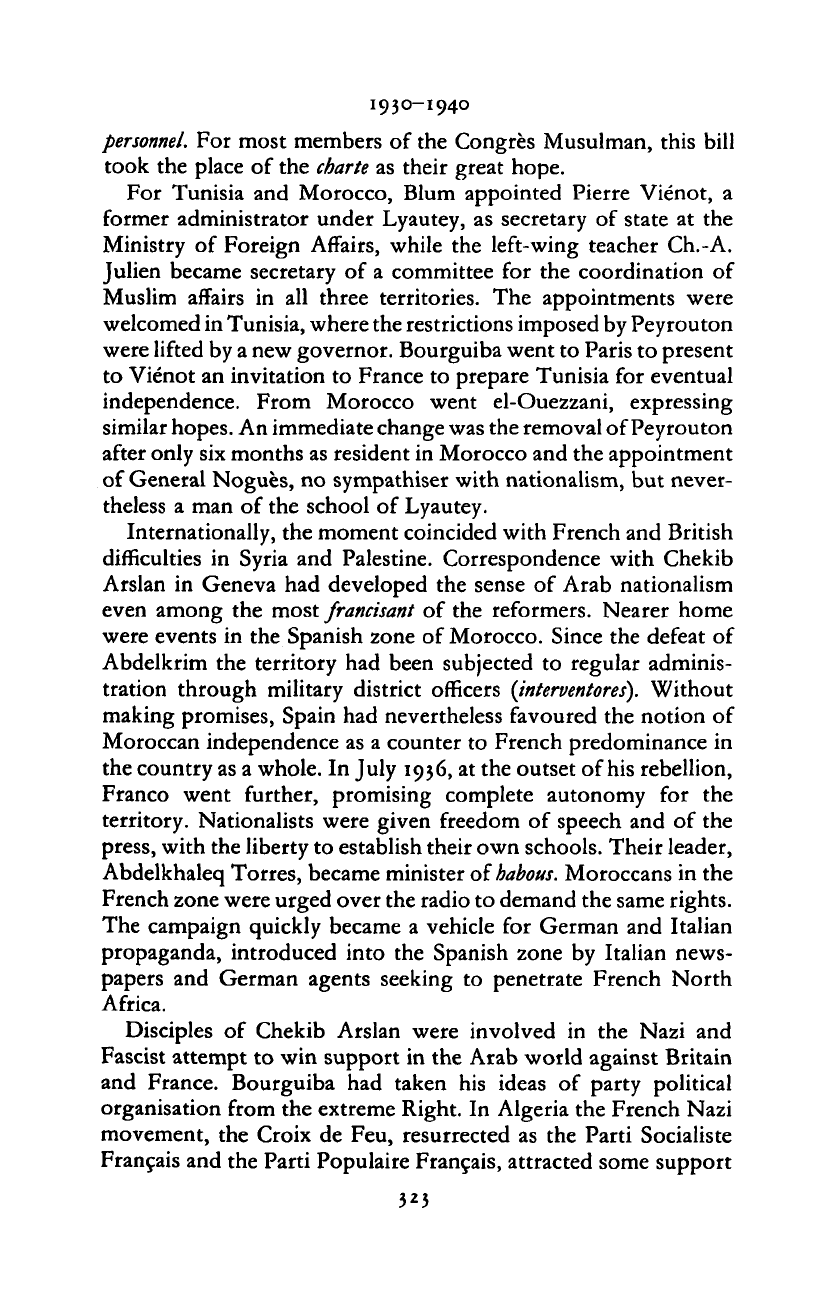
personnel.
For most members of the Congres Musulman, this bill
took the place of the
charte
as their great hope.
For Tunisia and Morocco, Blum appointed Pierre Vienot, a
former administrator under Lyautey, as secretary of state at the
Ministry of Foreign Affairs, while the left-wing teacher Ch.-A.
Julien became secretary of a committee for the coordination of
Muslim affairs in all three territories. The appointments were
welcomed in Tunisia, where the restrictions imposed by Peyrouton
were lifted by a new governor. Bourguiba went to Paris to present
to Vienot an invitation to France to prepare Tunisia for eventual
independence. From Morocco went el-Ouezzani, expressing
similar
hopes.
An immediate change was the removal of Peyrouton
after only six months as resident in Morocco and the appointment
of General Nogues, no sympathiser with nationalism, but never-
theless a man of the school of Lyautey.
Internationally, the moment coincided with French and British
difficulties in Syria and Palestine. Correspondence with Chekib
Arslan in Geneva had developed the sense of Arab nationalism
even among the most
francisant
of the reformers. Nearer home
were events in the Spanish zone of Morocco. Since the defeat of
Abdelkrim the territory had been subjected to regular adminis-
tration through military district officers
{interventores).
Without
making promises, Spain had nevertheless favoured the notion of
Moroccan independence as a counter to French predominance in
the country as a whole. In July 1936, at the outset of his rebellion,
Franco went further, promising complete autonomy for the
territory. Nationalists were given freedom of speech and of the
press,
with the liberty to establish their own schools. Their leader,
Abdelkhaleq Torres, became minister
oihabous.
Moroccans in the
French zone were urged over the radio to demand the same rights.
The campaign quickly became a vehicle for German and Italian
propaganda, introduced into the Spanish zone by Italian news-
papers and German agents seeking to penetrate French North
Africa.
Disciples of Chekib Arslan were involved in the Nazi and
Fascist attempt to win support in the Arab world against Britain
and France. Bourguiba had taken his ideas of party political
organisation from the extreme Right. In Algeria the French Nazi
movement, the Croix de Feu, resurrected as the Parti Socialiste
Francais and the Parti Populaire Francais, attracted some support
3
2
3
Cambridge Histories Online © Cambridge University Press, 2008
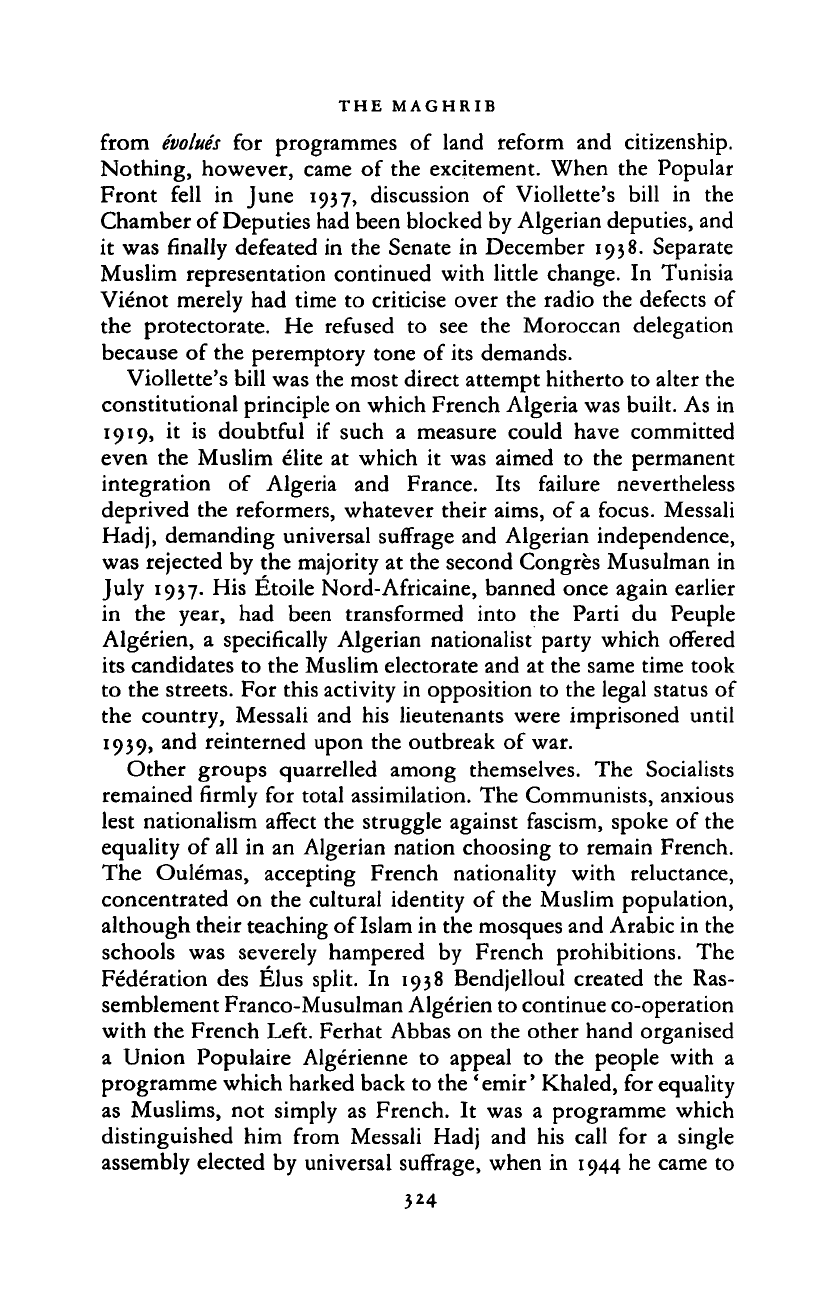
THE MAGHRIB
from
evolues
for programmes of land reform and citizenship.
Nothing, however, came of the excitement. When the Popular
Front fell in June 1937, discussion of Viollette's bill in the
Chamber of Deputies had been blocked by Algerian deputies, and
it was finally defeated in the Senate in December 1938. Separate
Muslim representation continued with little change. In Tunisia
Vienot merely had time to criticise over the radio the defects of
the protectorate. He refused to see the Moroccan delegation
because of the peremptory tone of its demands.
Viollette's bill was the most direct attempt hitherto to alter the
constitutional principle on which French Algeria was built. As in
1919,
it is doubtful if such a measure could have committed
even the Muslim elite at which it was aimed to the permanent
integration of Algeria and France. Its failure nevertheless
deprived the reformers, whatever their aims, of a focus. Messali
Hadj,
demanding universal suffrage and Algerian independence,
was rejected by the majority at the second Congres Musulman in
July 1937. His Etoile Nord-Africaine, banned once again earlier
in the year, had been transformed into the Parti du Peuple
Algerien, a specifically Algerian nationalist party which offered
its candidates to the Muslim electorate and at the same time took
to the streets. For this activity in opposition to the legal status of
the country, Messali and his lieutenants were imprisoned until
1939,
and reinterned upon the outbreak of war.
Other groups quarrelled among themselves. The Socialists
remained firmly for total assimilation. The Communists, anxious
lest nationalism affect the struggle against fascism, spoke of the
equality of all in an Algerian nation choosing to remain French.
The Oulemas, accepting French nationality with reluctance,
concentrated on the cultural identity of the Muslim population,
although their teaching of Islam in the mosques and Arabic in the
schools was severely hampered by French prohibitions. The
Federation des Elus split. In 1938 Bendjelloul created the Ras-
semblement Franco-Musulman Algerien to continue co-operation
with the French Left. Ferhat Abbas on the other hand organised
a Union Populaire Algerienne to appeal to the people with a
programme which harked back to the 'emir' Khaled, for equality
as Muslims, not simply as French. It was a programme which
distinguished him from Messali Hadj and his call for a single
assembly elected by universal suffrage, when in 1944 he came to
Cambridge Histories Online © Cambridge University Press, 2008
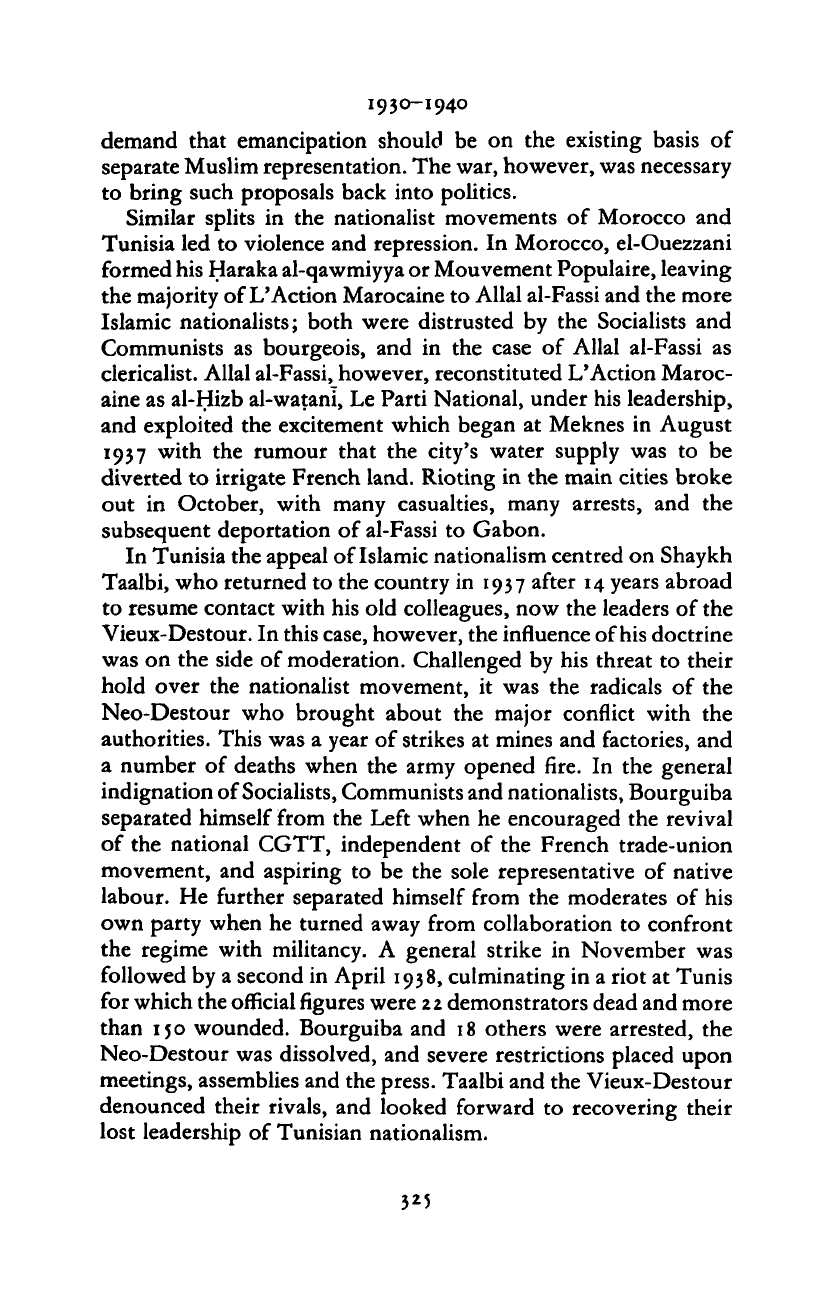
1930-194°
demand that emancipation should be on the existing basis of
separate Muslim representation. The war, however, was necessary
to bring such proposals back into politics.
Similar splits in the nationalist movements of Morocco and
Tunisia led to violence and repression. In Morocco, el-Ouezzani
formed his Haraka al-qawmiyya or Mouvement Populaire, leaving
the majority of L'Action Marocaine to Allal al-Fassi and the more
Islamic nationalists; both were distrusted by the Socialists and
Communists as bourgeois, and in the case of Allal al-Fassi as
clericalist. Allal al-Fassi, however, reconstituted L'Action Maroc-
aine as al-Hizb al-watani, Le Parti National, under his leadership,
and exploited the excitement which began at Meknes in August
1937 with the rumour that the city's water supply was to be
diverted to irrigate French land. Rioting in the main cities broke
out in October, with many casualties, many arrests, and the
subsequent deportation of al-Fassi to Gabon.
In Tunisia the appeal of Islamic nationalism centred on Shaykh
Taalbi, who returned to the country in 1937 after
14
years abroad
to resume contact with his old colleagues, now the leaders of the
Vieux-Destour. In this
case,
however, the influence of his doctrine
was on the side of moderation. Challenged by his threat to their
hold over the nationalist movement, it was the radicals of the
Neo-Destour who brought about the major conflict with the
authorities. This was a year of strikes at mines and factories, and
a number of deaths when the army opened fire. In the general
indignation of Socialists, Communists and nationalists, Bourguiba
separated himself from the Left when he encouraged the revival
of the national CGTT, independent of the French trade-union
movement, and aspiring to be the sole representative of native
labour. He further separated himself from the moderates of his
own party when he turned away from collaboration to confront
the regime with militancy. A general strike in November was
followed by a second in April 1938, culminating in a riot at Tunis
for which the official figures were
22
demonstrators dead and more
than 150 wounded. Bourguiba and 18 others were arrested, the
Neo-Destour was dissolved, and severe restrictions placed upon
meetings, assemblies and the press. Taalbi and the Vieux-Destour
denounced their rivals, and looked forward to recovering their
lost leadership of Tunisian nationalism.
3*5
Cambridge Histories Online © Cambridge University Press, 2008
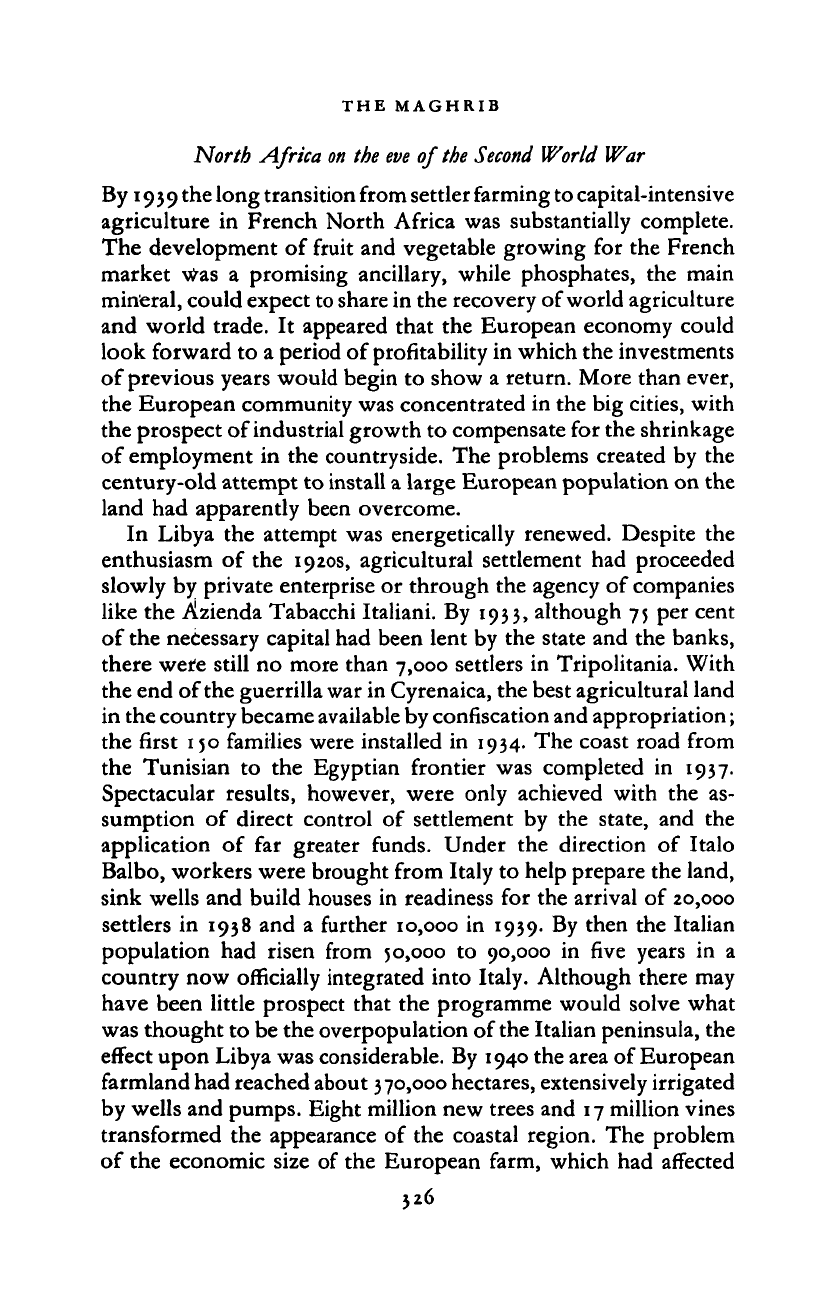
THE
MAGHRIB
North Africa
on
the
eve
of
the Second
World War
By 19 3
9
the long transition from settler farming to capital-intensive
agriculture in French North Africa was substantially complete.
The development of fruit and vegetable growing for the French
market was a promising ancillary, while phosphates, the main
mineral, could expect to share in the recovery of world agriculture
and world trade. It appeared that the European economy could
look forward to a period of profitability in which the investments
of previous years would begin to show a return. More than ever,
the European community was concentrated in the big cities, with
the prospect of industrial growth to compensate for the shrinkage
of employment in the countryside. The problems created by the
century-old attempt to install a large European population on the
land had apparently been overcome.
In Libya the attempt was energetically renewed. Despite the
enthusiasm of the 1920s, agricultural settlement had proceeded
slowly by private enterprise or through the agency of companies
like the A'zienda Tabacchi Italiani. By 1933, although 75 per cent
of the necessary capital had been lent by the state and the banks,
there wefe still no more than 7,000 settlers in Tripolitania. With
the end of the guerrilla war in Cyrenaica, the best agricultural land
in the country became available by confiscation and appropriation;
the first 150 families were installed in 1934. The coast road from
the Tunisian to the Egyptian frontier was completed in 1937.
Spectacular results, however, were only achieved with the as-
sumption of direct control of settlement by the state, and the
application of far greater funds. Under the direction of Italo
Balbo, workers were brought from Italy to help prepare the land,
sink wells and build houses in readiness for the arrival of 20,000
settlers in 1938 and a further 10,000 in 1939. By then the Italian
population had risen from 50,000 to 90,000 in five years in a
country now officially integrated into Italy. Although there may
have been little prospect that the programme would solve what
was thought to be the overpopulation of the Italian peninsula, the
effect upon Libya was considerable. By 1940 the area of European
farmland had reached about 370,000 hectares, extensively irrigated
by wells and pumps. Eight million new trees and 17 million vines
transformed the appearance of the coastal region. The problem
of the economic size of the European farm, which had affected
326
Cambridge Histories Online © Cambridge University Press, 2008
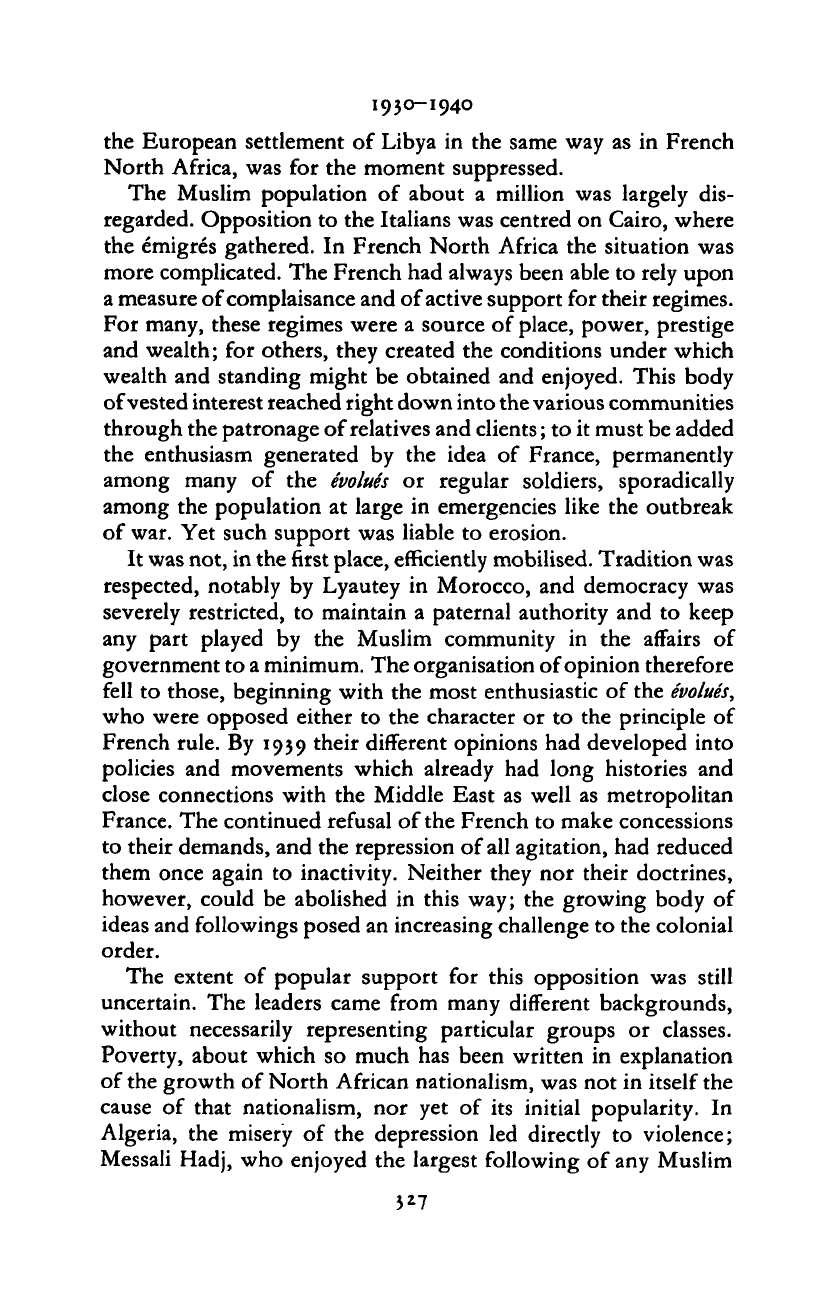
1930-194°
the European settlement of Libya in the same way as in French
North Africa, was for the moment suppressed.
The Muslim population of about a million was largely dis-
regarded. Opposition to the Italians was centred on Cairo, where
the emigres gathered. In French North Africa the situation was
more complicated. The French had always been able to rely upon
a measure of complaisance and of active support for their regimes.
For many, these regimes were a source of place, power, prestige
and wealth; for others, they created the conditions under which
wealth and standing might be obtained and enjoyed. This body
of vested interest reached right down into the various communities
through the patronage of relatives and clients; to it must be added
the enthusiasm generated by the idea of France, permanently
among many of the
evolues
or regular soldiers, sporadically
among the population at large in emergencies like the outbreak
of war. Yet such support was liable to erosion.
It was not, in the first place, efficiently mobilised. Tradition was
respected, notably by Lyautey in Morocco, and democracy was
severely restricted, to maintain a paternal authority and to keep
any part played by the Muslim community in the affairs of
government to
a
minimum. The organisation of opinion therefore
fell to those, beginning with the most enthusiastic of the
evolues,
who were opposed either to the character or to the principle of
French rule. By 1939 their different opinions had developed into
policies and movements which already had long histories and
close connections with the Middle East as well as metropolitan
France. The continued refusal of the French to make concessions
to their demands, and the repression of all agitation, had reduced
them once again to inactivity. Neither they nor their doctrines,
however, could be abolished in this way; the growing body of
ideas and followings posed an increasing challenge to the colonial
order.
The extent of popular support for this opposition was still
uncertain. The leaders came from many different backgrounds,
without necessarily representing particular groups or classes.
Poverty, about which so much has been written in explanation
of the growth of North African nationalism, was not in itself the
cause of that nationalism, nor yet of its initial popularity. In
Algeria, the misery of the depression led directly to violence;
Messali
Hadj,
who enjoyed the largest following of any Muslim
327
Cambridge Histories Online © Cambridge University Press, 2008
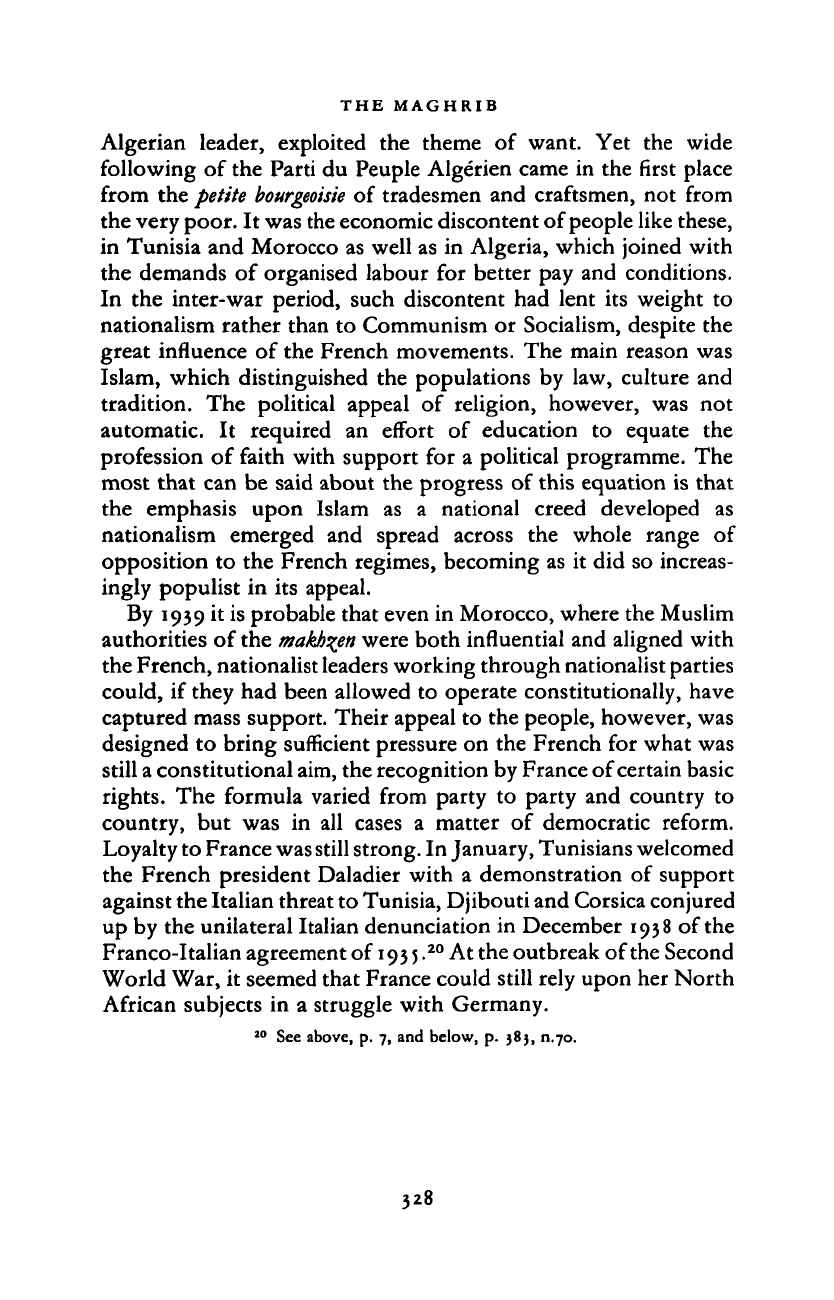
THE MAGHRIB
Algerian leader, exploited the theme of want. Yet the wide
following of the Parti du Peuple Algerien came in the first place
from the petite
bourgeoisie
of tradesmen and craftsmen, not from
the very poor. It was the economic discontent of people like these,
in Tunisia and Morocco as well as in Algeria, which joined with
the demands of organised labour for better pay and conditions.
In the inter-war period, such discontent had lent its weight to
nationalism rather than to Communism or Socialism, despite the
great influence of the French movements. The main reason was
Islam, which distinguished the populations by law, culture and
tradition. The political appeal of religion, however, was not
automatic. It required an effort of education to equate the
profession of faith with support for a political programme. The
most that can be said about the progress of this equation is that
the emphasis upon Islam as a national creed developed as
nationalism emerged and spread across the whole range of
opposition to the French regimes, becoming as it did so increas-
ingly populist in its appeal.
By 1939 it is probable that even in Morocco, where the Muslim
authorities of the
makh^en
were both influential and aligned with
the French, nationalist leaders working through nationalist parties
could, if they had been allowed to operate constitutionally, have
captured mass support. Their appeal to the people, however, was
designed to bring sufficient pressure on the French for what was
still
a
constitutional aim, the recognition by France of certain basic
rights.
The formula varied from party to party and country to
country, but was in all cases a matter of democratic reform.
Loyalty to France was still strong. In January, Tunisians welcomed
the French president Daladier with a demonstration of support
against the Italian threat to Tunisia, Djibouti and Corsica conjured
up by the unilateral Italian denunciation in December 1938 of the
Franco-Italian agreement of
193
5.
20
At the outbreak of the Second
World War, it seemed that France could still rely upon her North
African subjects in a struggle with Germany.
20
See above, p. 7, and below, p. 383, n.70.
328
Cambridge Histories Online © Cambridge University Press, 2008
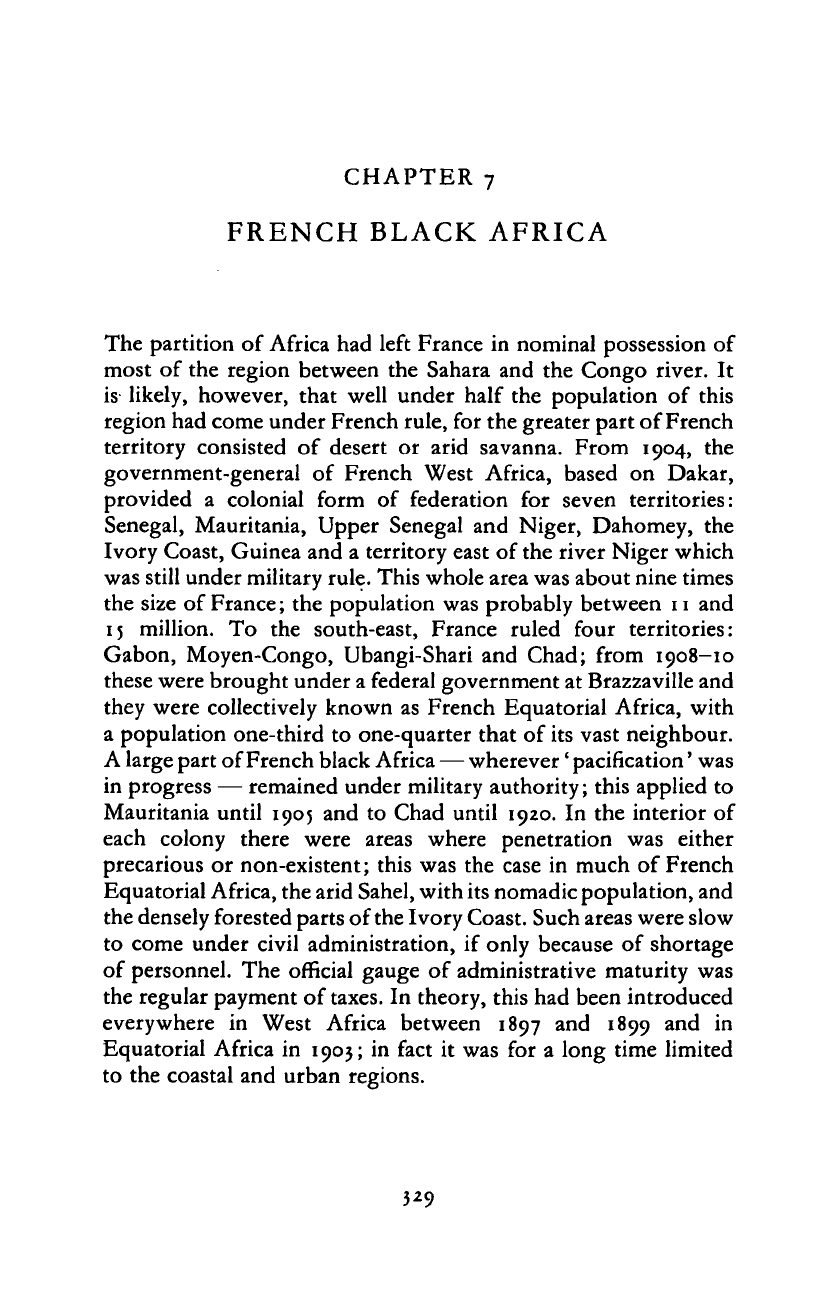
CHAPTER 7
FRENCH BLACK AFRICA
The partition of Africa had left France in nominal possession of
most of the region between the Sahara and the Congo river. It
is likely, however, that well under half the population of this
region had come under French rule, for the greater part of French
territory consisted of desert or arid savanna. From 1904, the
government-general of French West Africa, based on Dakar,
provided a colonial form of federation for seven territories:
Senegal, Mauritania, Upper Senegal and Niger, Dahomey, the
Ivory Coast, Guinea and a territory east of the river Niger which
was still under military rule. This whole area was about nine times
the size of France; the population was probably between 11 and
15 million. To the south-east, France ruled four territories:
Gabon, Moyen-Congo, Ubangi-Shari and Chad; from 1908-10
these were brought under a federal government at Brazzaville and
they were collectively known as French Equatorial Africa, with
a population one-third to one-quarter that of its vast neighbour.
A large part of French black Africa — wherever' pacification' was
in progress — remained under military authority; this applied to
Mauritania until 1905 and to Chad until 1920. In the interior of
each colony there were areas where penetration was either
precarious or non-existent; this was the case in much of French
Equatorial Africa, the arid Sahel, with its nomadic population, and
the densely forested parts of the Ivory
Coast.
Such areas were slow
to come under civil administration, if only because of shortage
of personnel. The official gauge of administrative maturity was
the regular payment of
taxes.
In theory, this had been introduced
everywhere in West Africa between 1897 and 1899 and in
Equatorial Africa in 1903; in fact it was for a long time limited
to the coastal and urban regions.
329
Cambridge Histories Online © Cambridge University Press, 2008
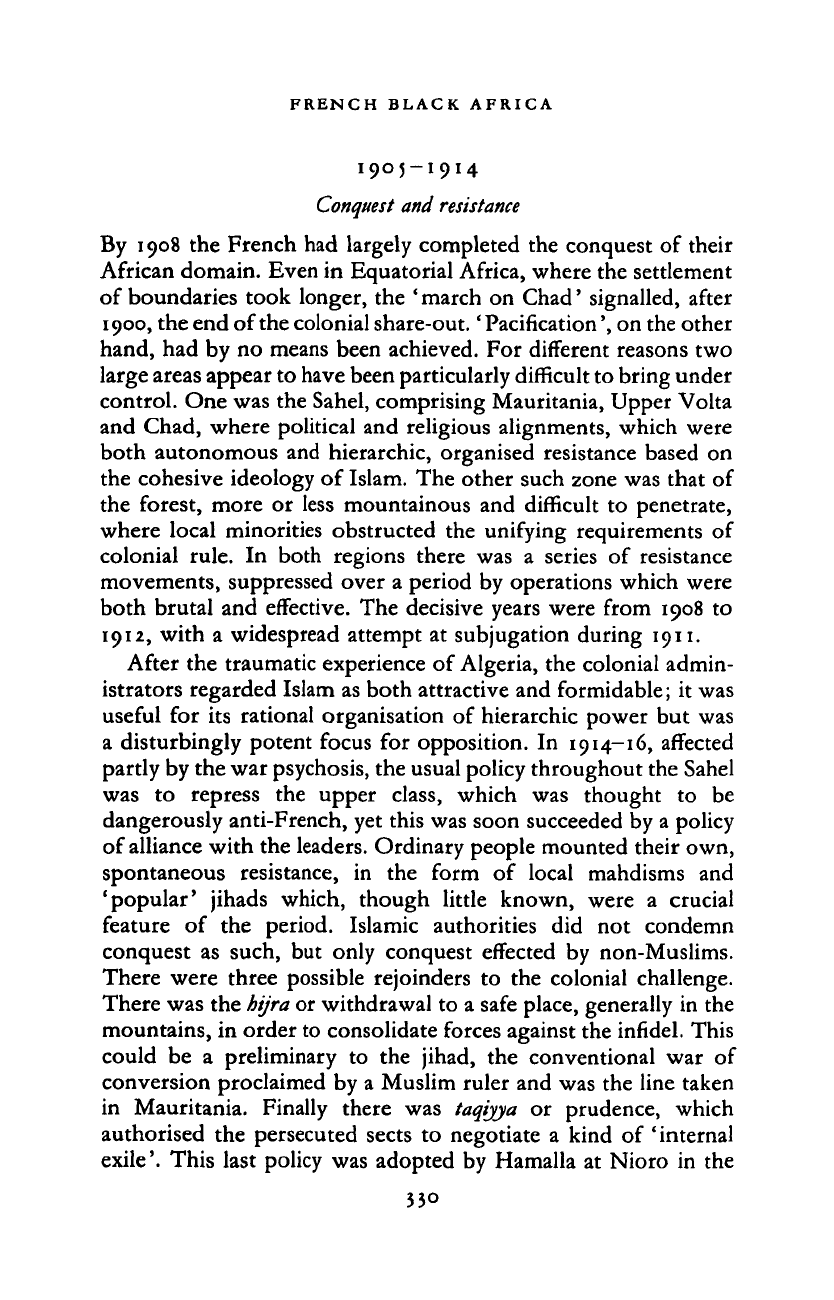
FRENCH BLACK AFRICA
I905-I914
Conquest and resistance
By 1908 the French had largely completed the conquest of their
African domain. Even in Equatorial Africa, where the settlement
of boundaries took longer, the
'
march on Chad' signalled, after
1900,
the end of the colonial share-out. 'Pacification', on the other
hand, had by no means been achieved. For different reasons two
large areas appear to have been particularly difficult to bring under
control. One was the Sahel, comprising Mauritania, Upper Volta
and Chad, where political and religious alignments, which were
both autonomous and hierarchic, organised resistance based on
the cohesive ideology of Islam. The other such zone was that of
the forest, more
or
less mountainous and difficult
to
penetrate,
where local minorities obstructed the unifying requirements
of
colonial rule.
In
both regions there was
a
series
of
resistance
movements, suppressed over a period by operations which were
both brutal and effective. The decisive years were from 1908
to
1912,
with
a
widespread attempt at subjugation during 1911.
After the traumatic experience of Algeria, the colonial admin-
istrators regarded Islam as both attractive and formidable; it was
useful for its rational organisation of hierarchic power but was
a disturbingly potent focus for opposition.
In
1914-16, affected
partly by the war psychosis, the usual policy throughout the Sahel
was
to
repress
the
upper class, which
was
thought
to be
dangerously anti-French, yet this was soon succeeded by a policy
of alliance with the leaders. Ordinary people mounted their own,
spontaneous resistance,
in the
form
of
local mahdisms
and
'popular' jihads which, though little known, were
a
crucial
feature
of the
period. Islamic authorities
did not
condemn
conquest
as
such, but only conquest effected
by
non-Muslims.
There were three possible rejoinders
to
the colonial challenge.
There was the
hijra
or withdrawal to a safe place, generally in the
mountains, in order to consolidate forces against the infidel. This
could
be a
preliminary
to the
jihad, the conventional war
of
conversion proclaimed by a Muslim ruler and was the line taken
in Mauritania. Finally there was taqiyya
or
prudence, which
authorised the persecuted sects
to
negotiate
a
kind
of
'internal
exile'. This last policy was adopted by Hamalla
at
Nioro
in
the
Cambridge Histories Online © Cambridge University Press, 2008
